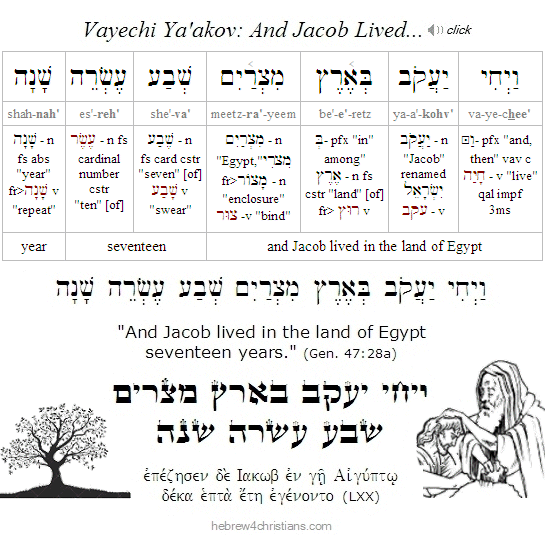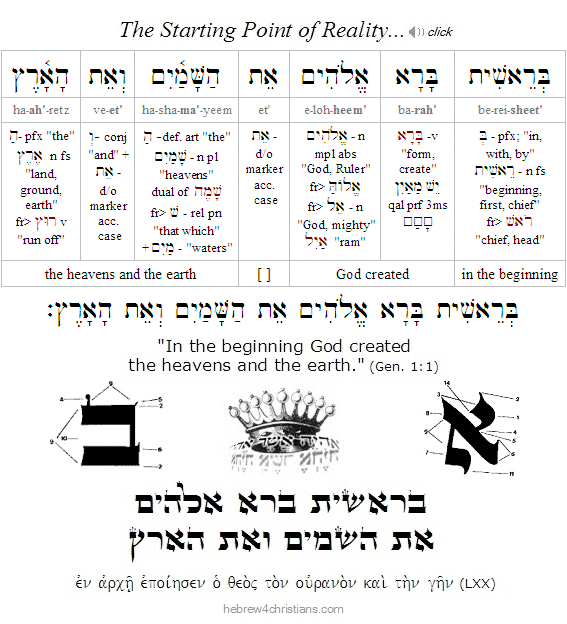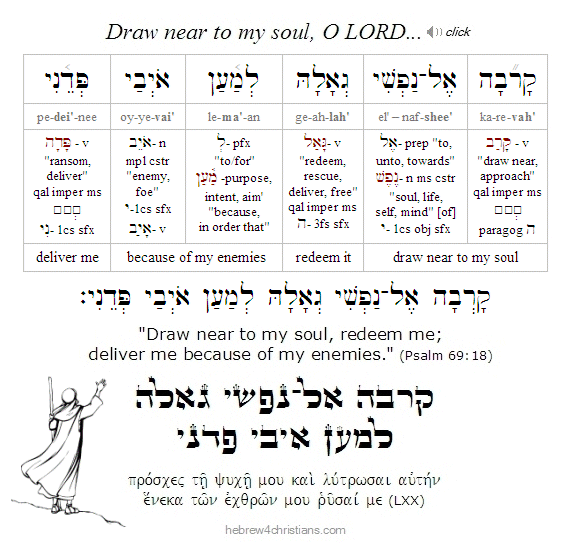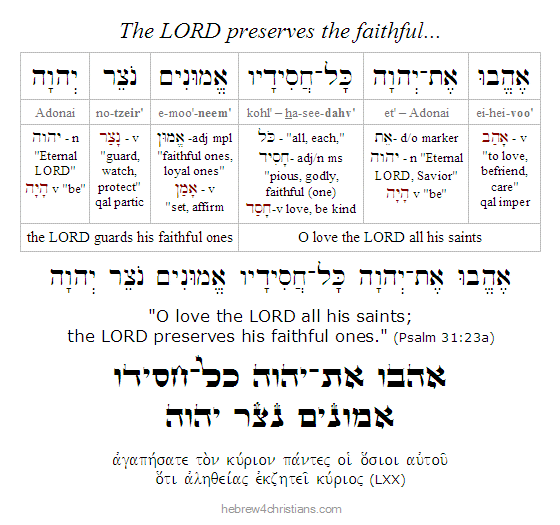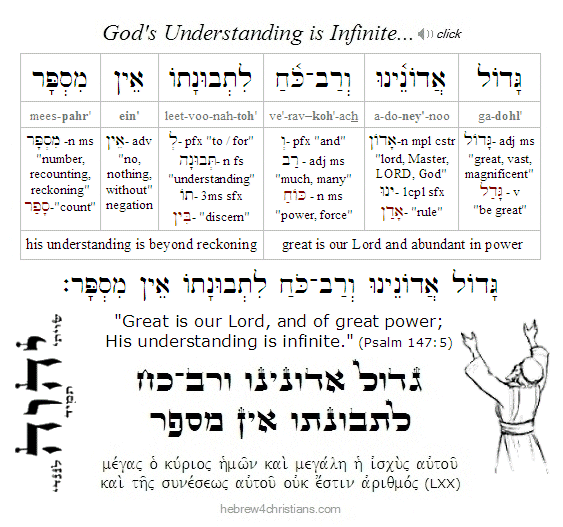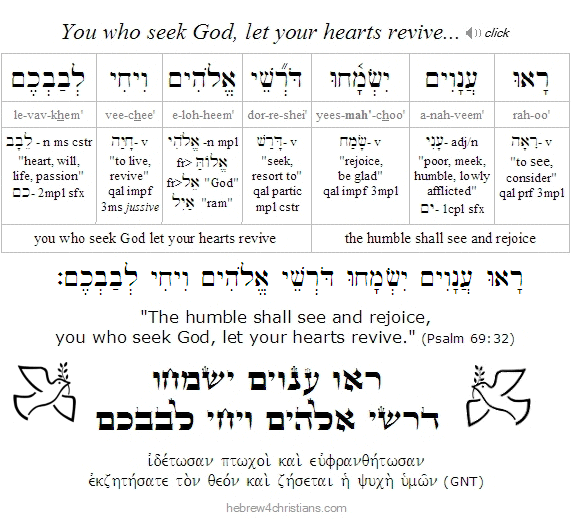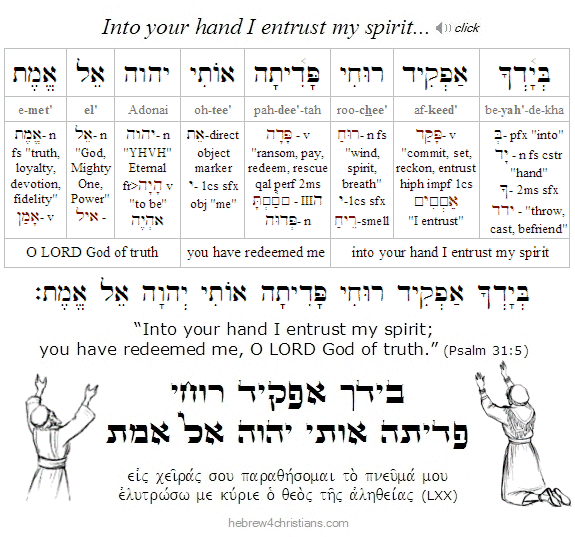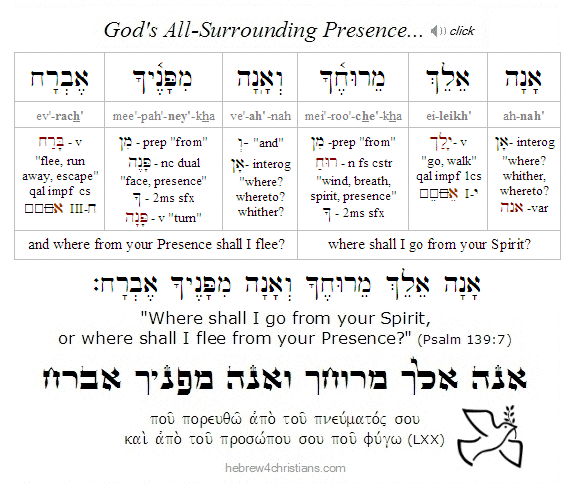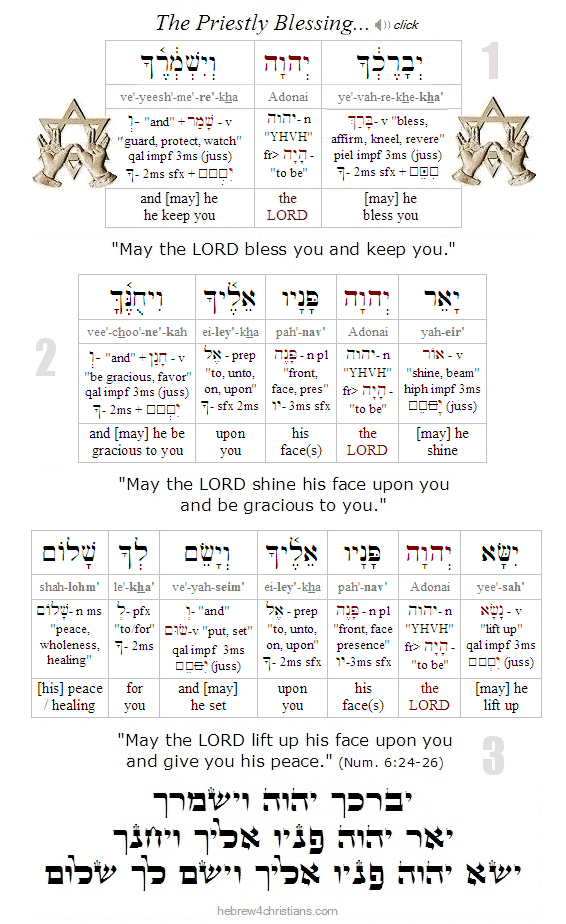|
January 2025 Updates (continued)
Note: If any page content appears to be missing, please refresh the page...
The Suffering of Love...
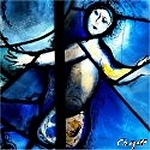
01.08.25 (Tevet 8, 5785) "From suffering I have learned this: That whoever is sore wounded by love will never be made whole unless she embrace the very same love that wounded her" (Mechtild of Magedburg).
Many of our deepest wounds come from those closest to ourselves. The pain of betrayal or abandonment hurts so much because our love and our need for love have been shattered.
We find healing for our brokenness by accepting the love that wounds us. We can do this because it is our love that must bear the wound and forgive its loss.
It's paradoxical that it is our own love that bears the wound, but the answer is not to forsake that love but to allow the voice of our pain to become intercession within us...
We can find consolation in our hope for complete redemption. Our pain and wounds are temporary and one day our tears will be wiped away. Our end is one of happiness and eternal life, despite the valley of the shadow of death through which we must pass.
Hebrew Lesson
Psalm 71:20 reading (click):
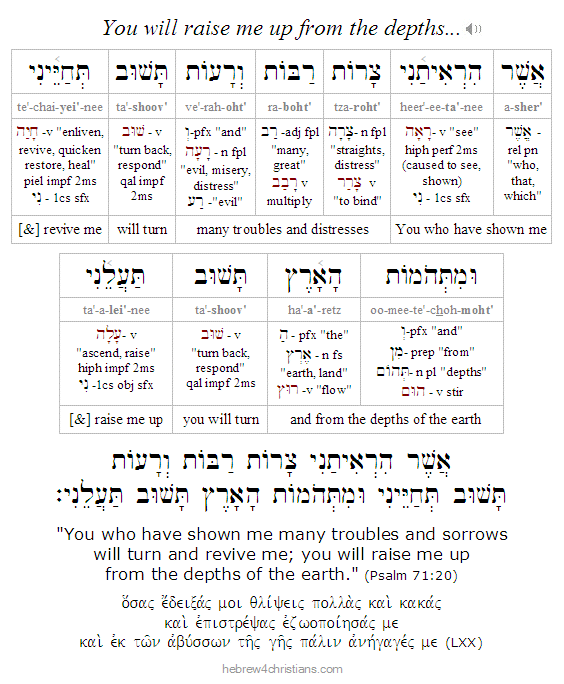 |
Endurance and Hope...
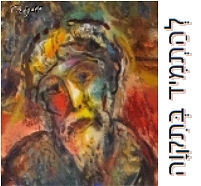
01.07.25 (Tevet 7, 5785) Sometimes we feel overwhelmed in our lives. There's so much going on; troubles, uncertainties, and so on. The world seems out of control; disinformation and "mind games" are the substance of the "postmodern news." We've become alienated, disorientated, and anxious; our emotions get the better of us, and we lapse into fearful thinking.... We are tempted to despair over our sins, our sufferings, and our ignorance.
At such times it is essential to redirect our attention by turning to God in "teshuvah" (תְשׁוּבָה) or "repentance." Teshuvah is our response to the question given by our present life circumstances. Deliberately seeking God's presence in the midst of our struggles is sometimes called "kavanah" (כַּוָנָה), a word that means "focus," "attention," or "concentration."
"When the enemy shall come in like a flood, the Spirit of the Lord shall lift up a standard against him" (Isa. 59:19). Set your heart in trust before God and reaffirm that his presence is both with you and for you. Despite the apparent chaos, look up and find your bearings. When we turn to the Lord with all our heart — with "all-that-is-within me" earnestness — then he will guide us and make our paths straight, despite ourselves... As it written in the holy words of Torah: "If from there you will seek the LORD your God, then you will find Him if you seek Him with all your heart and with all your soul" (Deut. 4:29). The "there" mentioned in this pasuk (verse) is the "there" of where we find ourselves, in our exile, awaiting the completion of our redemption... In this context teshuvah means believing that concealed good is present, despite the adversities we face...
Some people think they should turn to God for help only with their big problems, but not with the everyday struggles and inner conflicts that we face on a daily basis. This is a serious mistake. If God wants us to seek him be'khol levavkha -- "with all our heart," then understand that God wants all of us — and that includes our daily concerns, our missteps and sins, our sorrows and our joys. We turn to God in all that we are and in all that we do....
Yeshua taught us that the essence of Torah is mercy (Matt. 9:13; Matt. 23:23), and that God is close "in all our calling to Him" (Deut. 4:7), that is, in every appeal of our heart for Him. The Talmud says the central verse of Torah is "Know Him in all your ways" (Prov. 3:6), since by seeking the will of our heavenly Father, we attain the mitzvah (connection) of Torah.
The Hebrew word for trouble is "tzarah" (צָרָה), from the root idea of "constricting" or being bound (i.e., צָרַר). Indeed the land of Egypt, the house of slavery, is called mitzrayim (מִצְרַיִם), from a cognate root (צוּר) that means to "bind." This suggests that a narrow perspective is unable to understanding the "big picture."
Of course it is impossible for us to fully fathom God's ways (Isa. 55:8), though we can rely on Him to lead us and to trust that our testing in this life is not in vain. That is why the sages remark that the Hebrew word lamah (לָמָה) "why?" also spells the word le'mah (לְמָה) meaning "for what?" In other words, instead of asking why afflictions befall you, ask how they may help you grow closer to God...
"Relax, nothing is in your control," though everything is in the hands of your Heavenly Father who is faithful and who has has promised to guide your way. Amen.
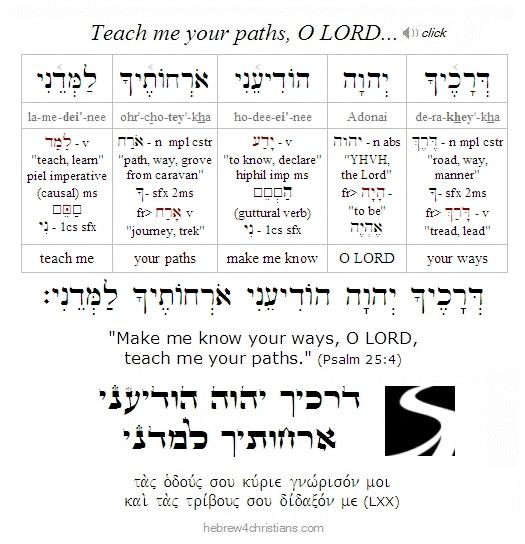 |
Faith in God's Plan...

The following is related to our Torah reading for this week, parashat Vayechi...
01.07.25 (Tevet 7, 5785) Recall that after Joseph dramatically revealed his true identity to his brothers, he asked them to draw near to him and then reassured them saying: "Do not be distressed or angry with yourselves because you sold me here, for God sent me before you to preserve for you a remnant on earth, and to keep alive for you many survivors. So it was not you who sent me here, but God" (Gen. 45:4-8). Here we see that Joseph was completely assured that everything that had happened to him up to this moment in time was by divine design, and that even his brothers' cruel betrayal was used by God to elevate him so that he would save many lives and to preserve the future of Israel (Rom. 8:28).
The brothers still wrestled with the shame of their past, however, not fully realizing that Joseph's elaborate charade as a disguised Egyptian was designed to give them opportunity to confess their sin and find healing. Because Joseph was so confident in the providential plan of God, however, he bore no ill-will or grudge against his brothers.
The sages note that after the burial of their father Jacob, however, the brothers were fearful that Joseph would finally seek retribution for what they had done to him, so they sent a fabricated a brief message to him which said: "Your father gave this command before he died: 'Say to Joseph, "Please forgive the transgression of your brothers and their sin, because they did evil to you."' And now, please forgive the transgression of the servants of the God of your father'" (Gen. 50:16-17). Joseph wept when he heard this because he realized that his brothers did not believe in his love for them. He repeated that God had sent him there to save lives, and for that he was grateful.
In this connection it is interesting to wonder how Jacob might have reacted after he had discovered the truth that his sons had lied to him after they had maliciously sold his beloved firstborn son into slavery. Perhaps Jacob would have identified with the plight of Joseph because they had much in common. After all, Jacob, like Joseph, had experienced slavery through the betrayal and animosity of his brother Esau. He may also have reviewed his own complicity with his mother when he treacherously "stole" the blessing" from his brother... Perhaps he blamed himself for showing partiality to Joseph after the death of his chosen wife Rachel, too... And we wonder: Did Jacob recall the vision of the ladder that ascended to heaven with the LORD standing above, proclaiming his promise to give him the land, and that in his descendants, all the families of the earth would be blessed. and moreover that the LORD God would never leave nor forsake him? (Gen. 28:12-15). Did he remember wrestling with the Angel, agonizing in his struggle to surrender his life to God's care by holding him to his promise? (Gen. 32:24-28). And how did he understand his beloved Joseph after he realized that he had been alive all along? When he was released from Pharaoh's dungeon, surely he could have sent messengers to inquire of his father and to tell him that he was alive? The story is bittersweet throughout.
Though we are not told of Jacob's emotional reaction to all of this, we later read in the Torah that he blessed all of his sons, both Joseph (and his sons Ephraim and Manasseh) and his other sons, despite having grieved his heart for over 22 years because of their cowardice and duplicity. But like Joseph, Jacob believed that God had orchestrated the affairs of his life - both the good and the evil - according to His sovereign will. Jacob would affirm Joseph's words to his brothers: "It was not you who sent me here, but God," though he also would confess his struggles and suffering along the way: "Few and evil have been the days of my life" (מְעַט וְרָעִים הָיוּ יְמֵי שְׁנֵי חַיַּי) he had told the Pharoah (Gen. 45:8).
Despite the ambivalence he undoubtedly felt, Jacob did not question God's justice or impugn God's character, nor did he blame his sons for his heartache. Jacob's silence in the face of his grief teaches us how to endure by faith, even in the midst of our own fears, struggles, and losses along the way.
And there remains a blessing to impart to others, despite all the troubles that beset our way, too. Our wounds are wounds borne within a heart of faith that refuses to let go of hope and healing. We may have made a mess of our lives; we may have hurt others and betrayed the duty to love, but we do not give up, we do not let our fear be the last word, we do not consign ourselves to despair. We find our consolation in the promise of God. As the book of Job teaches, we receive both the evil and the good from God's hand while affirming his justice, so that even though we return to the dust, we will keep our hope in him (Job 13:15).
We suffer, and life hurts. Often we are afraid. And if suffering is part of God's overarching plan for creation, if it is part of the "divine idea," then how do we learn to emotionally accept it without becoming bitter? We earnestly desire the love and blessing of God, but we are shaken when terrible things happen. We are told not to be afraid, that we are not alone, but we often do feel afraid and alone in our suffering...
First we must find faith that God's decision to create us is for our blessedness rather than for evil, or minimally that it is better for us to have been created than never to have been born (Jer. 29:11). In that sense trusting God represents an affirmation of our life and its value. Whether this is the "best of all possible worlds" is an abstract question for speculative theology, but where we live, in the raw and messy struggles of life, in the midst of our joys and elations, but also in our darkness and pain, we need faith to believe that our existence has some meaning and purpose, that our lives carry some significance, and that not everything is hevel havalim, "vanity of vanities."
The late Frederick Buechner reminds the heart of faith: "The worst isn't the last thing about the world. It's the next to the last thing. The last thing is the best. It's the power from on high that comes down into the world, that wells up from the rock-bottom worst of the world like a hidden spring. Can you believe it? The last, best thing is the laughing deep in the hearts of the saints, sometimes our hearts even. Yes. You are terribly loved and forgiven. Yes. You are healed. All is well." Amen.
So never yield to despair, since that leads to further darkness and fear. Press on and keep fighting the "good fight" of faith (1 Tim. 6:12). Remember that you infinitely matter to heaven; your life has great value; you are significant and you are truly loved by our Heavenly Father. There is a "future and a hope" reserved for you; there is "a white stone, and on that stone will be written a new name that no one can understand except the one who receives it" (Rev. 2:17). May "the trial of your faith, being much more precious than of gold that perishes, though it be tested with fire, be found to result in praise and glory and honor at the revelation of Yeshua the Messiah" (1 Pet. 1:7).
Hebrew Lesson
Jeremiah 29:11 reading (click):
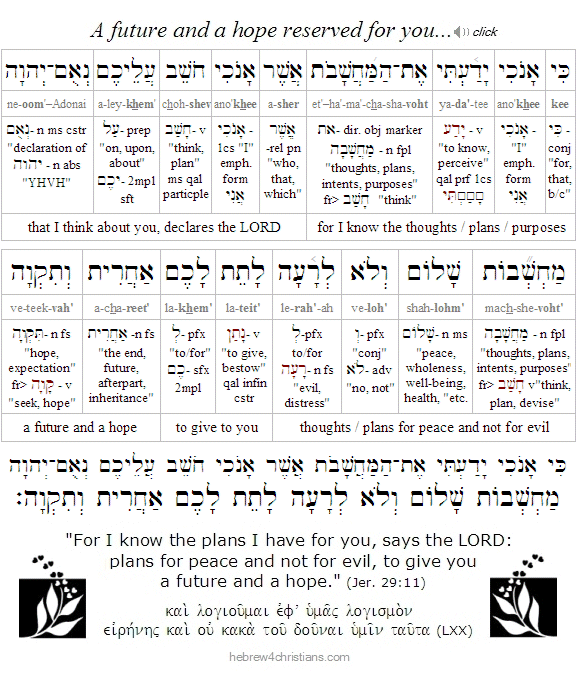 |
The Courage to Believe...
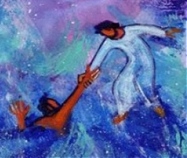
01.06.25 (Tevet 6, 5785) When you feel like you are losing hope, King David offers encouragement and wisdom, if you are willing to receive it: "Be strong and he shall strengthen your heart, all you who hope for the LORD" (Psalm 31:24).
To the doubting heart David simply says "be strong." The Hebrew word is just one word, "chizku" (חִזְקוּ), an imperative that means "take heart!" or "be brave!" or "be resolute!"
But how can we be commanded to be strong or brave when courage is just what we need in our time of fear? Is this some sort of wishful thinking? What might David mean?
The Hebrew root for the command to "be strong" (i.e., chazak: חזק) means to "harden" or to steel yourself inwardly - to make firm your conviction, and to resolutely decide to have hope despite your fear. Interestingly this same verb is used to describe when Pharaoh's heart was hardened as he refused to let Israel go.... With the same tenacity are we to refuse to let go of our hope, even to the very end.
King David then offers a promise based on his own experience. Once you have earnestly decided to hold fast to your hope, the Lord will "ratify" your decision by strengthening your heart. The logic goes something like this. If you decide to keep faith in God, then God will intervene and strengthen your resolve. The Hebrew verb used for "strengthen" (יַאֲמֵץ) is "hiphil," meaning it is causative: God's Spirit will cause your heart to be strengthened, to be strong, and to be full of courage.
As you make up your mind, the LORD will give you the heart and the will to go forward... Align your will with God's will ("thy will be done") and in your hope you will be empowered to do the miracle. "According to your faith be it done unto you."
When Ruth decided to cleave to her mother-in-law Naomi instead of going back to her former life, the Scripture says she was courageous: "And when Naomi saw that she was determined to go with her, she said no more" (Ruth 1:18). The Hebrew phrase "she was determined" uses the same language David used when he said God would strengthen the heart of faith. Ruth had inwardly reflected on the question whether to leave or to stay, but she made up her mind to remain with Naomi no matter what the cost. "For where you go I will go, and where you lodge I will lodge. Your people shall be my people, and your God my God."
The Hebrew word for courage (i.e., ometz: אוֹמֵץ) comes from the same Hebrew root (אמץ) used by David to say that God will give strength to your heart. It was the remarkable courage of Ruth - a Moabitess - that enabled her to become a member of Israel, the grandmother of King David and indeed of Yeshua himself!
Ruth's passion, as it was David's, was to press on in hope and cleave to God's promise. And this is God's appeal to us, too, for David adds that the relationship of the trusting heart and the power of God is available for all who sincerely look to him. The Hebrew word for "wait" (i.e., yachal: יָחַל) is a "piel" (intensive) form that expresses passionate and earnest desire or expectation -- a longing of the soul for God's presence.
Amen. When we decide to believe the promise, God will supply us with the strength and courage that reveals the blessing of Yeshua.
Hebrew Lesson
Psalm 31:24 reading (click):
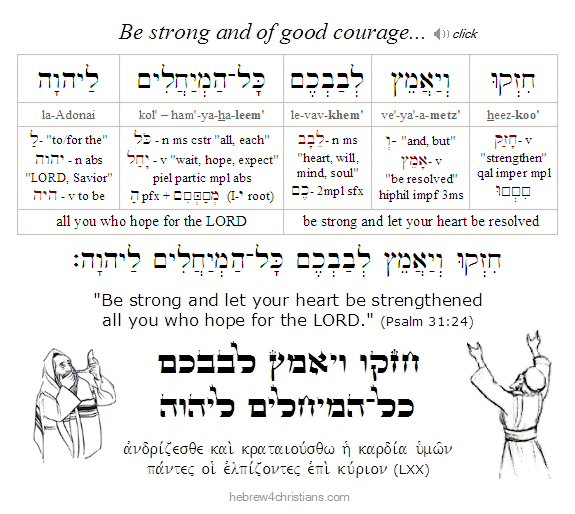 |
The Listening Heart...

01.06.25 (Tevet 6, 5785) Being a disciple of Yeshua is to be bonded to his heart: He is our Teacher and his curriculum is the way of our lives... The danger we face is losing sight of his living truth by attending to other matters. For instance, we can substitute our heart connection with him by focusing on "lesser matters of the law" (Matt. 23:23), i.e., by being "religious," or we can fool ourselves by presuming that the law "has come to an end" in order to justify our sins (Matt. 5:17-18). Either way, however, whether we be Torah observant "legalists" or lawless "antinomialists," we disregard what Yeshua wants from us.
It is God's Spirit and truth that enable us to have an intimate heart connection with the Living God (אֱלֹהִים חַי). This connection is grounded, first of all, in the confession of our great need for God's healing and love, and secondly, in our gratitude (faith) for God's Presence in our lives. "If we walk in the light, as He is in the light, we have fellowship with one another" (1 John 1:7). It is the truth of Yeshua that sets us free, and the gift of the freedom that God gives us is to learn to walk with Him and to know him in all our ways (Prov. 3:6).
Hebrew Lesson
Prov. 3:6 Hebrew reading:
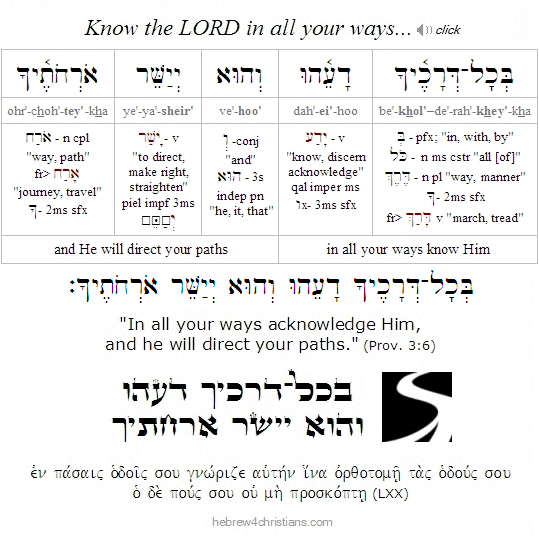 |
Vayechi - "And He Lived..."
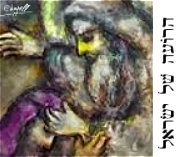
Our Torah for this week is Parashat Vayechi, the final portion from the Book of Genesis, which includes Jacob's great prophecy of the coming Messiah...
01.05.25 (Tevet 5, 5785) Our Torah reading for this week, parashat Vayechi (i.e., Gen. 47:28-50:26), recounts recounts how the great patriarch Jacob adopted Joseph's two sons (Ephraim and Manasseh) as his own children. When Jacob blessed the boys, however, he intentionally reversed the birth order by putting the younger before the older, signifying that the old struggle he had faced as a child was over, and he now understood things differently. The family had apparently learned that blessing from God is for the good of all, and that there is no real blessing apart from genuine humility that esteems the welfare of others.
Following this, Jacob summoned his sons together to hear his final words of blessing before he died. Of particular importance was Jacob's vision of the coming Messiah, the future King of Israel. It may have been supposed that Reuben, Jacob's firstborn son, would receive the honor of being heir to Messiah, but he was rejected because of his ill-conceived scheme to be regarded as the head of Israel after the death of Rachel, when Reuben "consorted" with Rachel's handmaid Bilhah. This must have been terribly painful to Jacob who was still in mourning over the death of his beloved wife. The betrayal of Bilhah would also have been a crushing blow. So, Reuben was not to be the heir of the promised one. Nor would Simeon, his second son, nor Levi, his third, for they had a history of violence and anger that appalled Jacob over the years - first exhibited when they murdered the Shechemites after their sister had been seduced and violated by a Canaanites prince there (Gen. 34).
When Jacob turned to regard his son Judah, however, he saw the promise of God. Judah, you will recall, had willingly offered up his life to save his brother Benjamin in accordance with his father's will. Because he was willing to die to fulfill his word to his father, Judah was to be praised and his brothers would bow before him. Judah is courageous a lion, willing to die for the sake of honor. Because of this, Judah was chosen be heir to the Messiah himself, the coming one who would exercise dominion over the nations: "The scepter shall not depart from Judah, not the ruler's staff from beneath his feet, until "Shiloh comes" (i.e., he to whom it belongs, namely the Messiah), and "to him shall be the obedience of the nations" (Gen. 49:10). Note that the second part of this prophecy refers to Messiah's coming as "ben David," the great "Lion of the tribe of Judah," who would wash his garments in the blood of God's enemies and subject the nations to the kingship of God (Gen. 49:11-12; Isa. 63:3). After this great declaration of the coming of Messiah, prophecies and blessings were then given over Jacob's other son's, and then Jacob carefully instructed his sons to bury him only in the promised land, and not in the land of Egypt (Gen. 49:10-12; 49:29-32).
Upon Jacob's death, Joseph and his brothers, with various dignitaries of Egypt, formed a funeral procession and returned to Canaan to bury him in the Cave of Machpelah in Hebron. After the funeral, they returned to Egypt, but Joseph's brothers feared that he would now repay them for their former betrayal and threw themselves on his mercy. Joseph reassured them that they had no reason to fear him and reminded them that God had overruled their earlier intent by intending him to be a blessing to the whole world (Gen. 50:20).
The portion ends with the account of the death of Joseph, who made the chiefs of Israel promise to take his bones with them when the LORD would bring them back to the land of Canaan (foreseeing the great Exodus to come). Joseph's faith in the Jewish people's return to the Promised Land is summarized by his statement: "God will surely remember you" (Gen. 50:24). He died at age 110, was embalmed and placed in a coffin in Egypt, full of faith that he would be raised from the dead in the land promised to Abraham, Isaac, and Jacob. Later he was buried in the area of Shechem, the first area of land purchased from the Hittites by Abraham (Gen. 23) that was given to Joseph as an inheritance (Gen. 48:22; Josh 34:22).
Hebrew Lesson:
Genesis 47:28a reading (click):
Concluding the Book of Genesis...
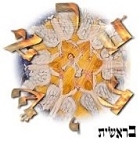
01.05.25 (Tevet 5, 5785) This week we will finish reading the Book of Genesis (i.e., Sefer Nereshit: סֵפֶר בְּרֵאשִׁית) for the current Jewish year... This incalculably essential book begins with an account of the creation of the universe by the LORD and the creation of man in His image and likeness. Genesis not only explains the origin of life itself but also the origin of death that came about through Adam's transgression, a condition of "spiritual death" that was passed on to Adam and Eve's descendants and that affects the very fabric of creation. The book then reveals the corruption of the first ten generations of humanity that eventually led to divine judgment by means of the worldwide flood (mabbul). From Noah's line, however, would come Abraham who was called by God to become the patriarch through whom the promised Deliverer would come. The remainder of the book focuses on the lives of the three great patriarchs (Abraham, Isaac, and Jacob), and ends with the story of Joseph, Jacob's firstborn son of Rachel, who eventually brought the entire family of Jacob to Egypt to escape famine. This of course set the stage for the great Exodus from Egypt under the leadership of Moses...
The book of Genesis ends with Joseph dying and being put into a coffin in Egypt (Gen. 50:26). Note that the word translated "coffin" is the Hebrew word aron (אֲרוֹן), a word used elsewhere in the Torah to refer exclusively to the Ark of the Covenant (the ark that Noah built and the ark that Moses was placed in are both called "teivah"). Throughout their desert wanderings, then, after the Sinai revelation, the Israelites carried two special arks - one holding the bones of Joseph and the other holding the tablets of the Ten Commandments.
Hebrew Lesson
Genesis 1:1 reading (click):
The Resurrection of Jacob...
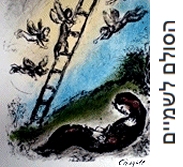
01.03.25 (Tevet 3, 5785) In our Torah portion this week, parashat Vayigash, Jacob's sons returned from Egypt and told their father that his beloved son Joseph was not dead but was very much alive, and that indeed he was none other than the Egyptian ruler who had earlier accused them of being spies! Jacob's response to this news was altogether remarkable: "And Jacob's heart went numb, because he did not believe them" (Gen. 45:26).
The Hebrew word used to describe Jacob's reaction is "vayafag" (וַיָּפָג), from a root (פּוג) that means to become numb, to faint, to cease or even to fail altogether. The Rambam comments on this word saying that his breathing stopped, his heart stopped within him, and he became like a dead person. He died inside.
What was the reason for this great shock, especially because the text says that he did not believe the report given by his sons? Well let's revisit how much Joseph had meant to Jacob - how he was the firstborn son of his chosen wife Rachel and the appointed family heir who would inherit the promise given to Abraham, Isaac, and to Jacob. Recall the coat of many colors that was given to honor his son; remember the visions Joseph received as a young man and that Jacob held in his heart (Gen. 37:9-11). Was not Joseph chosen by God, the "firstborn" of Israel? Were not the promises of God bound up in his son like the ropes that held his father Isaac upon the altar? Imagine his disappointment and sorrow when he heard that Joseph had been killed. The test wasn't like Abraham's who lifted up the knife to slay his son; Jacob's son was gone forever, and somehow he had to reconcile this with his hope that God was at work in his family. Jacob lived in an ongoing state of grief, so when he heard the "good news" that Joseph was alive and exalted, his heart could not comprehend the possibility, and he relived the death all over again.
The cognitive dissonance must have been extreme. Would the greatest loss of his broken heart be restored to him, but if so, would that imply something else had happened to his son, and perhaps his other sons had betrayed him? Like Thomas who doubted the resurrection of Yeshua, Jacob did not believe the testimony that Joseph was alive.
Another possibility that I've discussed before is that Jacob may have blamed himself for the death of his son and his guilt haunted his soul. Recall that it was Jacob who sent Joseph to report on his other sons like an overseer, and his brothers deeply resented this. And surely Jacob knew of the brother's jealousy for Joseph, and he only made matters worse by dressing him up as the favored son with his fancy tunic of many colors... The last time Jacob saw Joseph alive was when he sent him to his brothers, and he likely blamed himself for his death. He must have felt like he was the animal that tore Joseph apart. Perhaps reasons like these may explain why Jacob could not believe that his son was alive...
After Jacob listened to his sons emphatically declare that Joseph was alive, and when he saw the wagons full of goods, and that these were sent by Joseph to carry his father to Egypt to finally see his long lost son, "the spirit of their father revived, and Jacob said: 'Enough! My son Joseph is alive! I must go see him before I die" (Gen. 45:27).
We might ask whether this was enough to really change Jacob's mind to believe that Joseph was truly alive. Rashi said that among the various things in the wagons was a special "token" sent by Joseph that would prove that he was alive, and when Jacob saw it he believed. There is some speculation by the sages about what this sign was, though I think it must have been the extra gifts that were given exclusively to Benjamin -- the five extra sets of clothing and the 300 shekels of silver -- or perhaps it was something else, maybe a ring his father had given him as a young man, but regardless it was enough for Jacob's heart to revive and to believe that his son was alive.
On a psychological level the sign provided great comfort, because Jacob then understood that all that had happened was indeed part of God's greater plan. His beloved Joseph, the beautiful dreamer, the prophet of the family, the one who received visions from God about the destiny of the family, was assuredly alive! Jacob had not failed as a father or lost his son; the sign showed that Joseph understood all this... No wonder Jacob's heart revived within him as if he came back from the dead!
Hebrew Lesson
Psalm 116:10 reading (click):
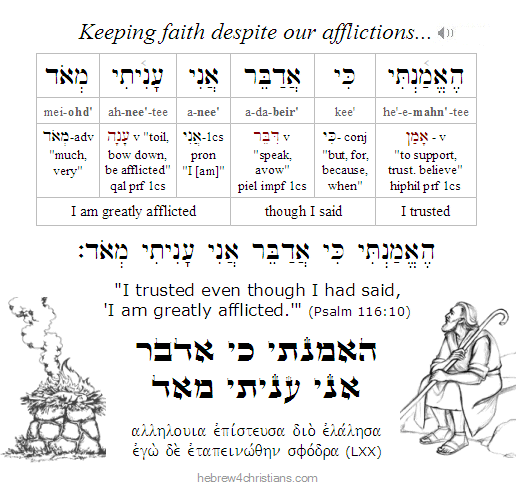 |
The Disguised Egyptian...
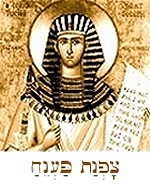
01.03.25 (Tevet 3, 5785) Our Torah reading this week (Vayigash) includes Judah's sincere expression of teshuvah (repentance) on behalf of his brothers for the betrayal of Joseph, an act that finally convinced the (disguised) brother to reveal his true identity: אֲנִי יוֹסֵף הַעוֹד אָבִי חָי / ani Yosef, ha'od avi chai / "I am Joseph; is my father alive?"
Before this dramatic disclosure took place, however, Joseph (thought to be an unknown Egyptian satrap) ensnared his brothers by hiding a silver divination goblet in Benjamin's sack and then sending his steward (his son Manesseh) to arrest Benjamin for stealing the goblet. All this was designed by Joseph to test his brothers. Would they abandon Benjamin, just as they had abandoned him to die in an empty well years earlier? After the arrest, the brothers returned to face the charges, and Judah nobly stepped forward and begged to take Benjamin's place for the "crime." When Joseph understood that Judah was willing to sacrifice his own life for his brother -- and when he saw the anxious looks of his other brothers -- he realized that they had learned their lesson.
Joseph then sent all the Egyptians out of the room, to spare his brothers embarrassment. According to Midrash, he then turned to his brothers and said, "You told me that your brother Joseph died. Are you sure?" "Yes, we are; he's dead," the brothers assured him. Joseph then became angry and said, "How can you lie? You sold him as a slave. I bought him and can call him right now." Joseph then called out, "Joseph, son of Jacob, come here right now to speak to your brothers."
Terrified, the brothers turned to see if Joseph was coming. When Joseph saw that his brothers were prepared to meet their brother and ask for his forgiveness, he then spoke to them in Hebrew, "Who are you looking for? I am Joseph. Is my father still alive?" (Notice that Joseph revealed himself to his brothers using Hebrew speech as the token of his identity.) When Joseph saw his brothers draw back in fear at his shocking disclosure, he reassured them by saying, g'shu na elai - "Please come near to me; come and see..."
The revelation of Joseph and his reconciliation with his brothers is a prophetic picture of acharit ha-yamim (the "End of Days") when the Jewish people, in Great Tribulation, will come to Yeshua as Israel's deliverer. Presently, the veil is still over the eyes of the Jewish people and they collectively regard Yeshua as an "Egyptian" of sorts.
On a pe'shat level (i.e., literal sense), when Joseph revealed his identity: ani Yosef ha'od avi chai ("I am Joseph; is my father alive?"), he was asking his brothers if his father Jacob was still physically alive. This is puzzling, since in earlier encounters the brothers attested that Jacob was very much alive... On a sod level (i.e., in a mysterious sense), since Joseph is a picture of Yeshua (Mashiach ben Yosef), the question can be phrased, "I am Yeshua - is My father alive?," that is, do you now understand the righteousness of God the Father in raising me from the dead and promoting me to His right hand? Yeshua therefore evokes the confession of faith from the beloved Jewish people: "I am your brother Yeshua: do you now understand that My Father is alive?"
Time is short, chaverim... We are approaching the End of Days and time of "Great Tribulation." In a soon-coming hour Yeshua will speak comforting words to His long-lost brothers (in Hebrew, to be sure!) and restore their place of blessing upon the earth. May He come speedily, and in our days. Maran ata, Yeshua!
Hebrew Lesson
Psalm 69:18 reading (click):
The Family of God...
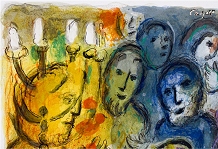
01.03.25 (Tevet 3, 5785) When Jacob and his family left the land of Canaan to be reunited with his long-lost son Joseph in Egypt, the Scripture says: "All the persons of the house of Jacob who went to Egypt were seventy" (Gen. 46:27), though the Hebrew text literally reads, "all of the soul (singular) of Jacob's household was seventy."
Rashi noted that the extended "household" of Jacob is referred to as "one soul" (i.e., kol ha'nefesh: כָּל־הַנֶּפֶשׁ), that is, an interconnected unity before the LORD. Perhaps this thought was the reason for the famous statement of the Talmud: "kol Yisrael arevim zeh ba'zeh," which means "all Israel is responsible for one another" (Shavuot 39a). This principle expresses the deep sense of communal responsibility among the Jewish people.
The idea of being an interconnected unity also applies to the "body of Messiah," that is, the worldwide community of those who have been redeemed by Yeshua, for he emphatically taught us to love one another as he has loved us (John 13:34). Indeed our love for one another bears witness that we are truly his people: "By this all will know that you are My disciples, if you have love for one another" (John 13:35).
The Apostle Paul therefore wrote: "For we, though many, are one bread and one body; for we all partake of that one bread" (1 Cor. 10:17), and he went on to use the analogy of the parts of the body united to form a whole to illustrate how the several parts should understand their mutual dependence, and that if one member were to suffer, all the others would suffer along with it (1 Cor. 12:26). We are as "one flesh" (בשר אחד) through our shared covenant with the Lord, and each of us therefore partakes of the lives of others.
Since we are all interconnected, we must esteem and care for one another. Let the honor of your brother and sister be as dear to yourself as if it were your own. As Paul said: "Let love be sincere. Abhor what is evil, cling to what is good. In love of the brothers be tenderly affectionate with one another, in honor preferring one another" (Rom. 12:9-10). The very law of Messiah (תורת המשיח) is to bear one another's burdens (Gal. 6:2).
For the same reasons, holding a grudge or wanting revenge is forbidden. Can the right hand cut off the left without itself suffering loss? Indeed we mirror one another in our hearts. "So in everything, do to others what you would have them do to you, for this sums up the Law and the Prophets" (Matt. 7:12). This is the great law of reciprocity: "Blessed are the merciful, for they shall obtain mercy."
Life is a test to establish our souls in the truth of faith. We are instructed to take every thought "captive" to the love of the Lord. If an unworthy thought enters your mind, cast it out and refuse it audience within your soul. Love your enemy and do good to those who hurt you, for doing so reveals you are a child of the heavenly Father (Matt. 5:44).
Since we are reading parashat Vayigash this week, let's consider again the story of Joseph who was a great tzaddik of Israel (צדיק ישראל). Despite the betrayal of his brothers he refused to harden his heart and become bitter. Joseph repaid his brothers with goodness and mercy, rescuing them from their own dark pit of rejection and shame. Because he was righteous, he drew near to them by grace based on the deepest of bonds of his heart.
The children of Joseph are God's beloved flock. In the Psalms we read "Give ear, O Shepherd of Israel, you who leads Joseph like a flock" (Psalm 90:1). Just as Joseph stored up food for years of famine, so God stores up blessing for us in the world to come. Amen.
Hebrew Lesson
Psalm 31:23a reading (click for audio):
A Life that Matters...
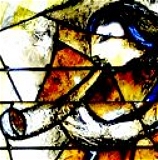
01.02.25 (Tevet 2, 5785) The Jewish sages likened the life of faith to be one of preparation: "This world is like a corridor before the World to Come; therefore prepare yourself in the corridor, that you may enter into the banquet hall" (Avot 4:21). We prepare ourselves by learning to be in relationship with the LORD. The great commandment is דִּרְשׁוּנִי וִחְיוּ - "Seek Me and live" (Amos 5:4), and as the prophet Isaiah cried out, "Seek the LORD while he may be found; call upon him while he is near" (Isa. 55:6).
It is an opportune occasion, at the outset of another "new year," to soberly revist the truth that our lives are relatively short and therefore we ought prepare ourselves for our ultimate destiny while we still have the chance. To borrow a cliche, "today is the first day of the rest of your life," and consequently whatever you do or don't do today will effect all of your tomorrows -- and even carry over into the world to come.
What isn't a cliche is the profound truth that even the seemingly smallest of decisions matter and that nothing is trivial. There is a "butterfly effect," and a small change in your life will produce big effects. Therefore, since by necessity "one thing leads to another," we must soberly realize the importance of our decisions and choose wisely. What we do today, the choices we make, will yield future blessing in our lives if we seek the good.
So what to do? How, then, shall we live today? Well for starters make some time to pray to the Lord. Make an effort to read and study the holy Scriptures. Memorize verses that speak to your heart. Meditate on God's Presence and love. Be filled with the Holy Spirit and turn away from dark thoughts and fears. Call or visit a friend. Listen to your friend and share their burdens. These are just a few suggestions, but the point is that the time we have today is our opportunity to live a life that really matters. Therefore choose life!
We can't turn back the clock but we can ask God to help us "redeem the time." He can restore the years that the locust has eaten, so it's never too late to begin! Let us seek lasting wisdom. Prepare your heart today so that when your hour comes to "enter the banquet hall," you will not be ashamed but overjoyed and ready to meet the Lord!
Above all do not let your heart be troubled; have faith in God, for he "prepares a place for you" on the other side of the veil of this temporal world (John 14:1-3). "Whoever is born of God conquers the world (νικᾷ τὸν κόσμον), and the overcoming power that conquers the world is our faith" (1 John 5:4). God will help you live a life that truly matters, if you ask him. Therefore while you still have breath, choose life....
Hebrew Lesson
Jeremiah 29:13 reading (click for audio):
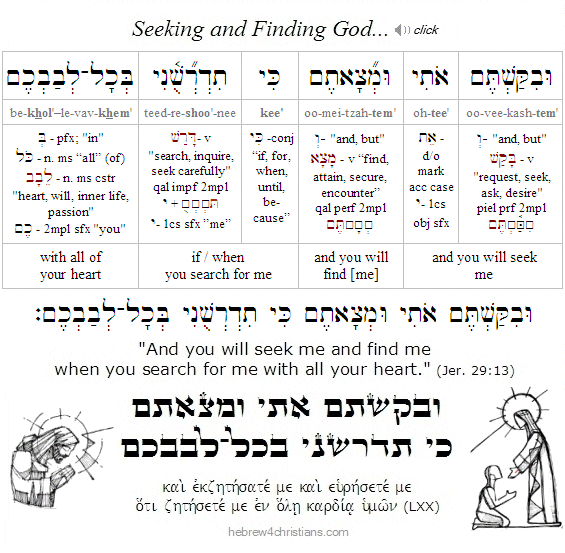 |
Mystery and Humility...

"God has chosen the foolish things of the world to shame the wise, and God has chosen the weak things of the world to shame the things which are mighty, and the base things of the world and the things which are despised God has chosen, and the things which are not, to bring to nothing the things that are, so that no flesh should glory in His presence." - 1 Cor. 1:27-29
01.02.25 (Tevet 2, 5785) Though it is important to guard our sincere convictions and to be passionate about what we believe, we must nevertheless be careful to walk in humility before the mystery of life... After all, much is inscrutable to us, much is beyond our understanding, and therefore, if we are honest, we should be reverent before the "sacred secrecy" of everything. Fanaticism and intolerance (whether secular or religious) is motivated by willful ignorance of the marvelous complexities that pervade existence. The fanatic invariably seeks to reduce life to a simple formula, idea, or generalization. The humble person, on the other hand, freely confesses that they "walk by faith, not by sight" -- by hearing the Word of God and heeding what the Spirit of God is saying to the heart...
For now we "see through a glass darkly," which literally means "in an enigma" (ἐν αἰνίγματι). An "enigma" (or riddle) is an analogy given through some resemblance to the truth, though quite often the correspondences are puzzling and obscure. Hence, "seeing through a glass darkly" means perceiving obscurely or imperfectly, looking "through" something else instead of directly apprehending reality. We see only a reflection of reality, and our knowledge in this life is indirect and imperfect. This is contrasted with the "face to face" (פָּנִים אֶל־פָּנִים) vision and clarity given in the world to come, when our knowledge will be clear and distinct, and the truth of God will be fully manifest and no longer hidden. Being "face to face" with reality means being free of the riddles, the analogies, the semblances, etc., which at best adumbrate our way..
Such reflection should make us humble whenever we share our faith. "Now we know in part, but then shall we know in whole" (1 Cor. 13:12). Let therefore repeat that an honest theology must find a place for mystery, for "seeing through a glass darkly," and for the apprehension of awe and wonder.
"There was a time when I had all the answers. My real growth began when I discovered that the questions to which I had the answers were not the important questions.... A genuine faith must recognize the fact that it is through a dark glass we see; though by faith we do penetrate sufficiently to the heart of the mystery so as not to be overwhelmed by it. A genuine faith resolves the mystery of life by the mystery of God. It recognizes that no aspect of life or existence explains itself, even after all known causes and consequences have been traced. All known existence points beyond itself. To realize that it points beyond itself to God is to assert that the mystery of life does not dissolve life into meaninglessness...." (Reinhold Niebuhr)
Since the LORD God is called the Infinite One (i.e., ein sof: אֵין סוֹף) whose understanding is without limit (Psalm 147:5), we must use analogies, metaphors, symbols, allusions, parables, poetry, and other linguistic devices (as well art and music) to convey spiritual truth and meaning. We compare (συγκρίνω) spiritual things with spiritual (1 Cor. 2:13). Some of the classical "mystics" have said the way to God is through the transcendence of words altogether, though most of them use imagery and poetry to speak about "ineffable" reality. Others, like Soren Kierkegaard, use "indirect communication" to evoke the decision to believe, to find hope, and to walk by faith. The truth can be found, not by means of humanistic learning, but by special revelation and encounter with the Truth of God.
Hebrew Lesson
Psalm 147:5 Hebrew reading:
For more on this topic, see "Mystery and Humility: Living in the Divine Connection."
Love's Great Humility...
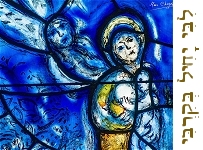
01.01.25 (Tevet 1, 5785) "Unless you turn (shuv) and become like children, you will never (οὐ μὴ) enter the kingdom of heaven" (Matt. 18:3). Such is the importance of simple trust in God... Indeed Yeshua repeatedly taught us to regard God as "Abba," our Father (אַבָּא אָבִינוּ). He taught that we are warmly accepted as part of his family; that we are under his constant care; and that we live within his household as beloved children... And even though God is utterly transcendent, the Infinite One (אין סוף) and Creator of all worlds, he humbles himself to feed the birds of the air, to water lilies of the field, and to count the number of hairs on your head (Psalm 113:5-6).
The Lord is as close as your next breath; he leans upon your bosom at the table; he anticipates what you need before you ask him... The "fear of the Lord" is that you might fail knowing his great love for you -- that you will forget or lose sight of your true identity in lesser things. Therefore affirm the truth that you are loved with an unending and everlasting love, that you are safe, that you are surely accepted, and that nothing can ever separate you from the power and truth of love. God your Father hears you, he knows you, and he loves you bekhol levavo (בְּכָל־לְבָבוֹ) - "with all his heart."
May we know God as our beloved Abba. "For you did not receive the spirit of slavery to fall back into fear, but you have received the Spirit of adoption by whom we cry, "Abba! Father!" The Spirit bears witness with our spirit that we are children of God, and if children, then heirs - heirs of God and fellow heirs with Messiah - even if we may suffer together with him to the end that we may also be glorified together with him" (Rom. 8:15-17). Amen...
Hebrew Lesson:
Psalm 69:32 Hebrew reading:
The Good Eye of Faith...
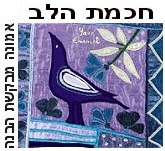
The following is related to this week's Torah reading, Parashat Vayigash...
01.01.25 (Tevet 1, 5785) Among other things, the story of Joseph reveals how God's hidden hand moves for good in our lives. Despite the terrible betrayal of the pit, the unjust suffering of the prison house, and the sorrow of losing his family, there was light, exaltation, and joy to come forth. God knows how to take our emptiness to yield "storehouses in Egypt..." As Joseph later told his brothers, "you meant evil against me, but God meant it for good" (Gen. 50:20). Resist the temptation to judge by mere appearances. Forbid your sorrow to blind the eyes of faith. Do not unjustly judge God's purposes or try to understand His ways; accept that He works all things together (συνεργέω) for good -- making even the wrath of man to praise Him (Psalm 76:10).
Faith "sees what is invisible" (2 Cor. 4:18) and understands (i.e., accepts) that the "present form of this world is passing away" for purposes that are good (1 Cor. 7:31). It affirms that underlying the surface appearance of life (chayei sha'ah) is a deeper reality (chayei olam) that is ultimately real, abiding, and ultimately designed for God's redemptive love to be fully expressed. In this world we must "see through" a mirror (i.e., indirectly) to begin to see the dawn of our eternal home; but one day we will behold God panim el panim (פָּנִים אֶל־פָּנִים), "face to face" (1 Cor. 13:12). In the meantime, faith beholds the invisible light, the truth of God's love that overcomes all the powers of darkness, hate, and fear.... "I believe. I believe in the sun even when it is not shining; I believe in love even when feeling it not; and I believe in God, even when God is silent" (from an anonymous poem found on the wall of a cellar in Cologne, Germany, where some Jews hid from the Nazis).
"Faith in divine providence is the faith that nothing can prevent us from fulfilling the meaning of our existence. Providence does not mean a divine plan by which everything is predetermined, as in an efficient machine. Rather, providence means that there is a creative and saving possibility implied in every situation, which cannot be destroyed by any event. Providence means that the demonic and destructive forces within ourselves and our world can never have an unbreakable grasp upon us, and that the bind which connects us with the fulfilling love can never be disrupted." - Paul Tillich
Hebrew Lesson:
Psalm 31:5 Hebrew reading (click):
For more on this important topic, see "Joseph and the Good Eye."
The Providential Prince...
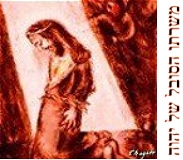
01.01.25 (Tevet 1, 5785) Though Joseph was given great wisdom to interpret Pharaoh's dreams and to serve as Egypt's regent, his foresight did not prevent the famine from coming in the first place, and the testing that came was part of God's hidden plan. The role of the true prophet is to bear witness to God's truth and to shepherd God's people through the unfolding vision. Joseph could not control the outcome, though he worked within the context of revelation to bring about deliverance. In both the "fat times and the lean" we look to God for comfort and strength: We "show up" every day to ready ourselves for what is coming, even if we currently find ourselves in darkness. We refuse fear because we trust that the LORD our God is guiding our way...
The term hashgachah pratit (הַשְׁגָּחָה פְּרָטִית) refers to God's personal supervision of our lives (hashgachah means "supervision," and pratit means "individual" or "particular"). Since He is the Master of the Universe, God's supervision and providence reaches to the smallest of details of creation - from subatomic particles to the great motions of the cosmos. God not only calls each star by its own name (Psalm 147:4), but knows each particular wildflower and sparrow (Matt. 6:28-30, 10:29). Each person created in the likeness of God is therefore under the direct, personal supervision of God Himself -- whether that soul is conscious of that fact or not. As Yeshua said, even the hairs on your head are all numbered (Matt. 10:30). The God of Israel is also called אלהֵי הָרוּחת לְכָל־בָּשָׂר / Elohei ha-ruchot lekhol-basar: "The God of the spirits of all flesh" (Num. 16:22), and that means that he has providential purposes for every human being brought into this world (John 1:4).
Hebrew Lesson
Psalm 139:7 reading (click):
A New Year Blessing...
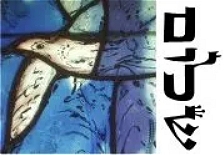
01.01.25 (Tevet 1, 5785) At the outset of the new civil year, let us recall the ancient priestly blessing, the great expression of hope and grace that transforms us into "name bearers" of God. The blessing of the LORD guards us from illusion, directing our hearts to focus on what matters most; His radiance changes us, revealing the miracle of grace. As God "lifts up his face," he discloses his Presence within all things, and imparts to us his healing peace. God's Name is "put upon" us so that we become vessels that carry redemptive love and healing to the world. We are endowed with divine energy to be made fruitful; we are empowered to serve God in the truth. The consciousness of our blessedness touches every moment, and we begin to see all of life as sanctified, sacred, full of wonder and meaning.
יְבָרֶכְךָ יְהוָה וְיִשְׁמְרֶךָ
יָאֵר יְהוָה פָּנָיו אֵלֶיךָ וִיחֻנֶּךָּ
יִשָּׂא יְהוָה פָּנָיו אֵלֶיךָ וְיָשֵׂם לְךָ שָׁלוֹם
ye·vah·re'·khe·kha' · Adonai · ve·yeesh'·me·re'·kha
yah·eir · Adonai · pah·nav · e·ley'·kha · vee·khoon·ne'·kah
yee·sah · Adonai · pah·nav · e·ley'·kha · ve·yah·seim · le·kha · shah·lohm

"May the LORD bless you and keep you;
May the LORD shine his face upon you and be gracious to you;
May the LORD lift up his face upon you and give you his peace."
(Num. 6:24-26)

Hebrew Study Card
Note that the text of this great "priestly blessing" (i.e., birkat kohanim) begins with three words, is comprised of three parts, invokes the divine Name three times, and is therefore quite appropriately called "the three-in-one blessing." Note further that each of the three phrases begins with the Hebrew letter Yod (י), suggesting the threefold hand of YHVH (יהוה) that touches you: the Father blesses you (יְבָרֶכְךָ); the Word of God shines upon you (יָאֵר), and the Spirit of God lifts you up and carries you in the way of life (יִשָּׂא). The threefold blessing is One, of course, just as Adonai echad: יְהוָה אֶחָד, the LORD is One (Deut. 6:4), and the essence of the blessing is to partake of healing and wholeness as expressed in the Hebrew word shalom (שָׁלוֹם). Amen. Without oseh shalom, without peace made within our hearts, any other blessings are only apparent and without genuine substance...
Hebrew Lesson
Numbers 6:24-26 reading (click):
<< Return
|
|
















